
Lothar Machtan (born 4 October 1949) is a German historian, writer, as well as professor of Modern and Current History at the University of Bremen.

Lothar Machtan (born 4 October 1949) is a German historian, writer, as well as professor of Modern and Current History at the University of Bremen.
Born in Gelsenkirchen, Machtan studied history and political sciences at Heidelberg University from 1968 to 1974. 15 years later he became professor of modern history at the University of Bremen. Furthermore, he worked as a researcher in Konstanz, Berlin, Kassel, Halle and at the Claremont McKenna College in California. The main field of his historical work is the cultural history of politics.[ citation needed ]
For 30 years, Machtan has researched German history, politics, and socioeconomics. His writings have been featured in newspapers and magazines such as Der Spiegel as well as radio broadcasts. [1]
He has been a guest lecturer at international conferences and symposia and a consultant for German TV programs such as Varzin – Warcino – Ein unbequemes Erbe (Warcino – An uncomfortable legacy, 1989). In the United States, he was a featured guest on NBC's The Today Show and The Early Show on CBS. The author of several books and numerous publications on the social and political history of the 19th and 20th centuries, in 1998 Machtan published Bismarcks Tod und Deutschlands Tränen (Bismarck's Death and Germany's Tears).
In 2001, he published Hitlers Geheimnis: Das Doppelleben eines Diktators (Hitler's Secret: The double life of a dictator) with an English translation by John Brownjohn entitled The Hidden Hitler . In it, Machtan presents a documented study which he claims establishes Adolf Hitler's homosexuality and the impact of this upon his life and career. The book was not well received by historians, who dispute Machtan's conclusion that Hitler was homosexual. [2]
In discussing his book in The Washington Post , Machtan told his interviewer that his research showed that some of Hitler's homosexual friends in Munich were the ones who opened many important doors for him, especially Ernst Röhm, Dietrich Eckart, and Ernst Hanfstaengl. [1] [n 1] Machtan told the newspaper that "without their help he [Hitler] would not have had the support that he got from bourgeois circles and even from intellectuals and artists. [3] In 2004, the documentary film Hidden Führer: Debating the Enigma of Hitler's Sexuality was made based on The Hidden Hitler. Aired by HBO's CINEMAX Reel Life, it follows Machtan as he travels around Germany to the places of Hitler's youth and explains his thesis and evidence.
Machtan's book, Der Kaisersohn bei Hitler (The Kaiser's son at Hitler's), was released in March 2006. His book Die Abdankung: Wie Deutschlands gekrönte Häupter aus der Geschichte fielen (The Abdication – How Germany's crowned heads fell out of history), was published in October 2008.

Ernst Julius Günther Röhm was a German military officer and a leading member of the Nazi Party. Initially a close friend and early ally of Adolf Hitler, Röhm was the co-founder and leader of the Sturmabteilung (SA), the Nazi Party's original paramilitary wing, which played a significant role in Adolf Hitler's rise to power. He served as chief of the SA from 1931 until his murder in 1934 during the Night of the Long Knives.
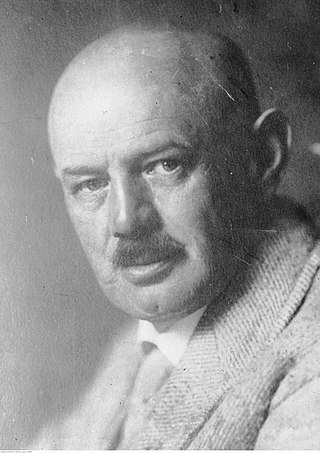
Dietrich Eckart was a German völkisch poet, playwright, journalist, publicist, and political activist who was one of the founders of the German Workers' Party, the precursor of the Nazi Party. Eckart was a key influence on Adolf Hitler in the early years of the Party, the original publisher of the party newspaper, the Völkischer Beobachter, and the lyricist of the first party anthem, Sturmlied. He was a participant in the failed Beer Hall Putsch in 1923 and died on 26 December of that year, shortly after his release from Landsberg Prison, from a heart attack.

The political views of Adolf Hitler, dictator of Germany from 1933 to 1945, have presented historians and biographers with some difficulty. His writings and methods were often adapted to need and circumstance, although there were some steady themes, including antisemitism, anti-communism, anti-parliamentarianism, German Lebensraum, belief in the superiority of an "Aryan race" and an extreme form of German nationalism. Hitler personally claimed he was fighting against "Jewish Marxism".

Ernst Franz Sedgwick Hanfstaengl was a German American businessman and close friend of Adolf Hitler. He eventually fell out of favour with Hitler and defected from Nazi Germany to the United States. He later worked for Franklin D. Roosevelt and was once engaged to the author Djuna Barnes.
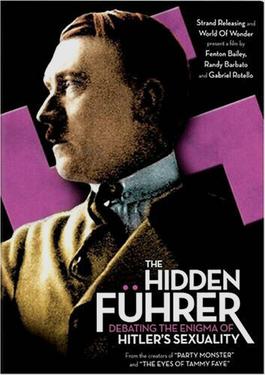
Hidden Führer: Debating the Enigma of Hitler's Sexuality is a documentary film based on the research of German Professor Lothar Machtan for his 2001 book The Hidden Hitler that claimed Adolf Hitler was a homosexual. Aired by HBO's CINEMAX Reel Life, the 90 minute documentary was directed by Fenton Bailey, Randy Barbato and Gabriel Rotello and was produced by Gabriel Rotello.
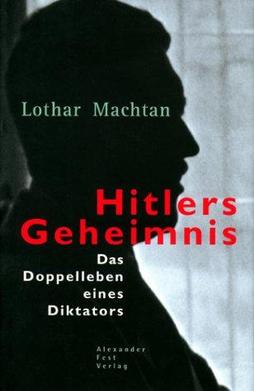
The Hidden Hitler is a 2001 book by German professor and historian Lothar Machtan. The German original was published by Alexander Fest Verlag, while the English-translated version was published by Basic Books in New York City. (ISBN 0-465-04308-9)

Brigitte Hamann was a German-Austrian author and historian based in Vienna.
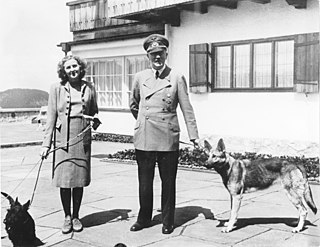
The sexuality of Adolf Hitler, dictator of Germany from 1933 to 1945, has long been a matter of historical and scholarly debate, as well as speculation and rumour. There is evidence that he had relationships with a number of women during his lifetime, as well as evidence of his antipathy to homosexuality, and no evidence of homosexual encounters. His name has been linked to a number of possible female lovers, two of whom committed suicide. A third died of complications eight years after a suicide attempt, and a fourth also attempted suicide.
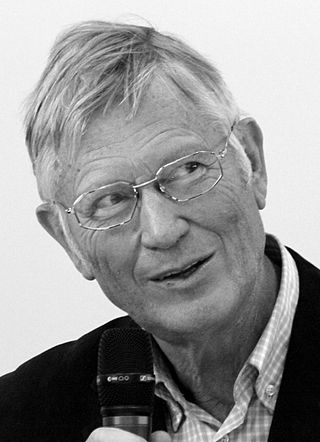
Joachim Radkau is a German historian.
Erna Hanfstaengl, was the elder sister of Ernst ("Putzi") Hanfstaengl and was an acquaintance of Adolf Hitler. She also befriended Unity Mitford, who lived with Erna for a period.

The Stennes revolt was a revolt within the Nazi Party in 1930 through 1931 led by Walter Stennes, the Berlin commandant of the Sturmabteilung (SA), the Nazi's "brownshirt" storm troops. The revolt arose from internal tensions and conflicts within the Nazi Party of Germany, particularly between the party organization headquartered in Munich and Adolf Hitler on the one hand, and the SA and its leadership on the other hand. There is some evidence that Stennes may have been paid by the government of German chancellor Heinrich Brüning, with the intention of causing conflict within the Nazi movement.

The Mind of Adolf Hitler: The Secret Wartime Report, published in 1972 by Basic Books, is based on a World War II report by psychoanalyst Walter C. Langer which probed the psychology of Adolf Hitler from the available information. The original report was prepared for the United States' Office of Strategic Services (OSS) and submitted in late 1943 or early 1944; it is officially entitled A Psychological Analysis of Adolph Hitler: His Life and Legend. The report is one of two psychoanalytic reports prepared for the OSS during the war in an attempt to assess Hitler's personality; the other is Analysis of the Personality of Adolph Hitler by the psychologist Henry A. Murray who also contributed to Langer's report.

Michael Hesemann is a German historian, Vatican journalist and author. As a student he became known in Germany as an author of several books on UFOs and extraterrestrial visitors on Earth. Later in his career he turned to topics related to Catholicism, history and archaeology.
Hans Walter Aust was a German journalist.
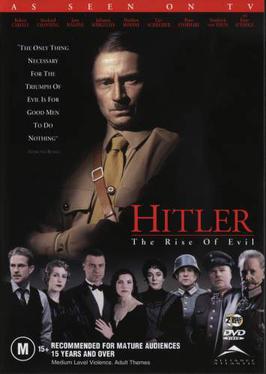
Hitler: The Rise of Evil is a Canadian television miniseries in two parts, directed by Christian Duguay and produced by Alliance Atlantis. It stars Robert Carlyle in the lead role and explores Adolf Hitler's rise and his early consolidation of power during the years after the First World War and focuses on how the embittered, politically fragmented and economically buffeted state of German society following the war made that ascent possible. The film also focuses on Ernst Hanfstaengl's influence on Hitler's rise to power. The miniseries, which premiered simultaneously in May 2003 on CBC in Canada and CBS in the United States, received two Emmy Awards, for Art Direction and Sound Editing, while Peter O'Toole was nominated for Best Supporting Actor.
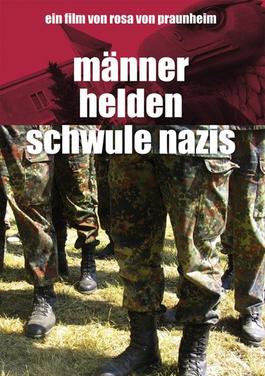
Men, Heroes and Gay Nazis is a 2005 German documentary film directed, written and produced by Rosa von Praunheim. The film focuses on gay men who align themselves with hardcore authoritarian views, white power skinheads, and Nazis.
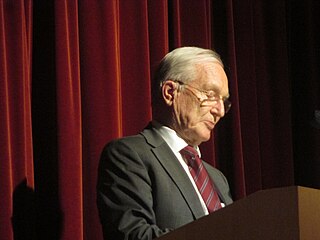
Lothar Gall is a German historian known as "one of German liberalism's primary historians". He was professor of history at Goethe University Frankfurt from 1975 until his retirement in 2005.

Karl Alexander von Müller was a German historian. His immediate disciples were Nazi politicians and academics such as Baldur von Schirach, Rudolf Heß, Hermann Göring, Walter Frank, Wilhelm Grau, Wilfried Euler, Clemens August Hoberg, Hermann Kellenbenz, Karl Richard Ganzer, Ernst Hanfstaengl and Klaus Schickert. However, due to his political openness, other non-Nazi historians such as Karl Bosl, Alois Hundhammer, Heinz Gollwitzer and even Wolfgang Hallgarten also studied under Müller. He had also taught the medievalist Edward Rand.
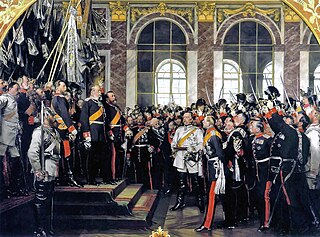
The proclamation of the German Empire, also known as the Deutsche Reichsgründung, took place in January 1871 after the joint victory of the German states in the Franco-Prussian War. As a result of the November Treaties of 1870, the southern German states of Baden, Hesse-Darmstadt, with their territories south of the Main line, Württemberg and Bavaria, joined the Prussian-dominated "North German Confederation" on 1 January 1871. On the same day, the new Constitution of the German Confederation came into force, thereby significantly extending the federal German lands to the newly created German Empire. The Day of the founding of the German Empire, January 18, became a day of celebration, marking when the Prussian King William I was proclaimed German Emperor at the Palace of Versailles.
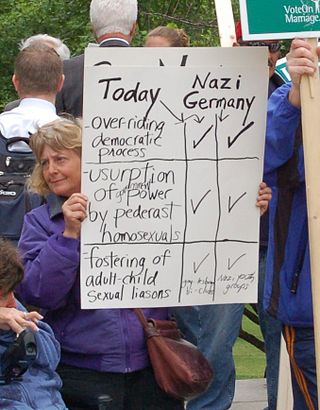
There is a widespread and long-lasting myth alleging that homosexuals were numerous and prominent as a group in the Nazi Party or the identification of Nazism with homosexuality more generally. It has been promoted by various individuals and groups both before and after World War II, especially by left-wing Germans during the Nazi era and the Christian right in the United States more recently. Although some gay men joined the Nazi Party, there is no evidence that they were overrepresented. The Nazis harshly criticized homosexuality and severely persecuted gay men, going as far as murdering them en masse. Therefore, historians regard the myth as having no merit.
To be clear, there are few reputable historians today who would argue that Hitler was gay, and their arguments have not been seen as persuasive... Lothar Machtan's The Hidden Hitler (New York: Basic Books, 2001) has not generally been well received by historians.